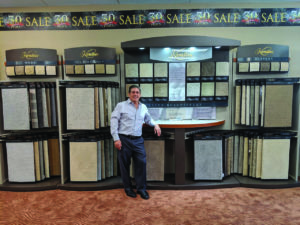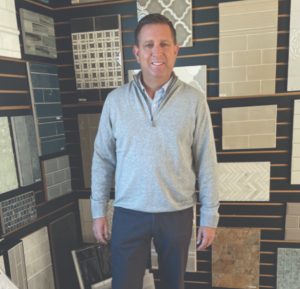By K.J. Quinn— “We are Open!” For several flooring retailers, these are the first words now found at the top of their websites following the COVID-19 outbreak. While dealers across the country are not likely to shut down altogether in the event of another major outbreak, they do admit that the way in which they do business has forever changed. For some, store hours have shortened, resulting in a more harmonious working environment for staff and better service for customers; while for others it was the implementation of new technologies that will continue to grow business moving forward.
Here’s how some retailers are now operating in the “new normal.”
Shortened hours, better service

Some 18 months after the pandemic hit the U.S., many of the measures flooring dealers implemented during the early days remain in effect. One of the biggest changes is limited store hours as local government regulations governing store traffic have eased. “We are now closed on Sunday, and we reduced our store hours by an hour during the week, closing at 7 p.m. as opposed to 8 p.m.,” said Eric Langan, president and owner, Carpetland USA, Davenport, Iowa.
Capitol Carpet & Tile, Boynton Beach, Fla., was previously open seven days a week and weekdays until 8 p.m. “After COVID-19, we reduced our sales staff to a skeleton crew for a short period, closed at night and Sunday,” said Lou Morano, president. “As we got busier, we started to take back more sales staff.”
Indoor City of Lancaster, based in Pennsylvania, is open three to four fewer hours on weekdays (9 a.m. to 5 p.m.) and moved closing time from 5 p.m. to 3 p.m. on Saturday. “We maintained the same amount of business and a certain work-life balance people appreciate,” said Ryan Commerce, president.
The reduced number of store hours did not adversely affect businesses, according to dealers. “Business has still been good and [sales] are up 12%,” said Penny Carnino, director of operations at Grigsby’s Carpet, Tile & Hardwood, Tulsa, Okla. This despite the fact the store is no longer open on Thursday evenings. “People are spending more time at home and then deciding to remodel. That certainly has contributed to the uptick in business.”
When COVID-19 infection rates declined and stores re-opened, staffing was cited as a major issue for most retailers. Initially, the amount of business trickling in did not justify maintaining personnel at pre-pandemic levels and there were employees who were hesitant to come back to work. “We did not have as many people on the retail floor as years past,” said John Stacy, vice president, S&H Flooring, Granbury, Texas. “We did write up more commercial business last year than our norm to try and make up for the impact.”
Florida’s Capitol Carpet retained its top salespeople, which allowed it to service all customers and help the 35-year- old retailer do more business than ever before. “Our sales staff is happier, make more money [and do not work] nights or Sundays,” Morano said. “Our customers are being serviced better with a higher qualified sales staff.”
Leveraging technology
Flooring dealers wasted no time utilizing technology to bring people back to the stores. For example, store operators utilized social media platforms to stay connected with their customer base. New communication channels explored to supplant in-person interactions and show products in ways the sales team had never done before, such as virtual consultations and web call applications.
“We did Zoom calls when we met with some of our builder clients,” Indoor City’s Commerce said. “We allow several of our salespeople to work virtually from home. Some of our builder contract salespeople have found that it works well.”
Some flooring retailers embrace the virtual sales process and plan to incorporate it as a permanent option. Salespeople said they found that it speeds up the sales process and helps boost efficiency. “Sometimes the sale will be done without a visit in the store or the home,” Capitol Carpet’s Morano pointed out. “In this case, we have very specific protocols to ensure the customer’s expectations are met with product, color, etc., with signoffs on all documentation and selections.”
Many flooring shoppers prefer the safety and convenience of shopping from home, a service that reportedly spiked during the pandemic. “We plan to get more involved with ‘shop at home,’” noted Elisabeth Stubbs, owner, Enhance Floors & More, Marietta, Ga.
Safety first

When stores began to reopen, a key priority was health and safety. Dealers emphasized health and safety first in their marketing messages online and on social media while assuring customers the stores had taken extra precautions to provide a safe and clean in-store shopping environment. “We took precautions in the showroom, wore masks with customers and had hand sanitizer on all desks,”
Grigsby’s Carnino said. “In multiple locations around the showroom, we had plexiglass on the reception desk and on a few of salespersons’ desks.”
Some of those initial precautions have remained. “When the COVID-19 infection numbers are up, we definitely find we can social distance in the showroom,” Enhance Floors & More’s Stubbs said. “It’s 6,000-plus square feet, so there is plenty of room to spread out.”
In addition to social distancing practices, other measures still implemented by retailers include providing hand wipes and sanitizers, taking the temperature of customers as they enter the store and keeping the premises clean. “We have hand sanitizer and face masks available for all customers and staff members,” Carpetland’s Langan said. “We clean and disinfect workspaces and common areas on a regular basis.”
As restrictions on store traffic let up nationwide, so have the stricter safety precautions, such as wearing masks in-store. However, some dealers continue to use masks while allowing their customers to decide their own comfort level. “For the longest time, masks were required to be worn by everybody,” Indoor City’s Commerce observed. “We still wear masks, although oftentimes our customers come in and ask if they can take their mask off, which we allow them to do.”
Facing challenges

While retailers are no strangers to adversity, conducting business during a global pandemic presented challenges no one could have ever imagined. From supply chain slowdowns and log jams to labor constraints, flooring dealers continue to tackle hardships.
An early challenge that has been mostly mitigated were the concerns over installers entering homes, which were high during the onset of the COVID-19 pandemic. “We’ve had installers wear masks upon arrival at customers’ homes,” Grigsby’s Carnino said. “It’s been a challenge to find an installer willing to wear one during the installation process, but we’ve managed.”
However, finding laborers who are willing to wear masks during installation is nothing compared to the hardship of finding labor itself. A never-ending issue exacerbated during the pandemic is indeed the labor shortage, namely warehouse help and installers. “It’s obvious that COVID-19 has caused massive disruptions to the supply channel as well as the labor pool,” Carpetland’s Langan observed. “It’s difficult to get both product and people right now.”
Langan isn’t alone in his assessment. Supply chain challenges continue to wreak havoc on flooring businesses nation-wide. “It’s been a challenge to keep up with demand and some of the supply chain issues,” Indoor City’s Commerce said. “It’s an absolute challenge and a discussion we have to have—to check stock prior to customers falling in love with a floor—and trying to manage expectations.”
For several months the supply chain disruptions have created major delays in flooring deliveries and contributed to a backlog of orders at retail. “Some customers are willing to wait for what they want and for others we find different options,” Grigsby’s Carnino said. “It remains to be seen when some of the back order issues will be resolved.”

